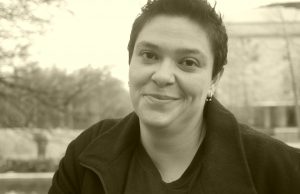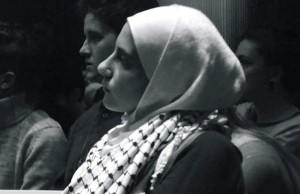“Eating the Other” (at Fat Ho Burgers): Desire and Resistance (Remixed)
At the corner of 11th Street and Ross Avenue in Waco, Texas sits a new eatery: Fat Ho Burgers (or, as some like to call it, “The Fat Ho”), a family owned operation run by Lakita Evans, a 23-year-old African American woman who saw the restaurant business as an opportunity to build a better life. Before coining Fat Ho Burgers, Evans struggled to make ends meet. She is one of six children reared by a single mother in Waco, Texas where the median income for a household is approximately $29,826 per year, non-family income is approximately $17,882 per year, approximately 28.8% of the population live below the poverty line, and most female workers make considerably less than their male counterparts. Nevertheless, determined to break her cycle of poverty, Evans put herself through college, studying culinary arts at a local community college by day, and working the produce department at Walmart by night. However, one evening while watching Mo’Nique’s 2006 film, Phat Girlz, she got inspired to do something more. Evans recently stated the following to the Texas Monthly:
All I wanted to do is find a way in this economy…I was just planning on opening a regular burger shack. I didn’t know it was going to be like this. (Source)
However, Evans has found more than a her “way.” She has also found that strategic marketing of “the Other” for mass consumption is highly profitable in a city where conservative religious and political ideals sometimes run rampant, the intersections between race, sex, class and gender may spark violence, and where the option of literally eating a “fat ho” appeals to both the taste buds and the fetishization of black female “flesh” (which is simultaneously disavowed through the sublimation of black female “flesh” for animal “flesh”). Fat Ho Burgers has been selling out daily. However, a recent food review by Sonia Smith at the Texas Monthly makes you wonder why. She states:
While the name will get you in the door, the food won’t necessarily keep you coming back.… The Supa Fly Ho with Cheese was not especially juicy—or fatty, as the restaurant’s name would suggest—and the patty itself was almost charred. Evans’ offerings are unlikely to score her a spot on Texas Monthly’s 50 Best Burgers list unless her cooking catches up to her marketing acumen. In the meantime, she can cash in on the name’s shock value.
And, that’s exactly what she’s doing. Two Baylor freshmen, a conservative Christian University, interviewed by Smith, visited the restaurant (and waited over an hour for their food) because they were admittedly intrigued by the name. And, as if visiting and eating at “The Fat Ho” wasn’t enough, Smith reports that both students “happily” stated “they’d buy Fat Ho T-shirts if the restaurant were to sell them.” Great.
To my dismay, much of the media attention on this story has focused on Evans, the 23-year-old restaurateur. While some have lauded her for marketing ingenuity, others have chastised her for moral recklessness and cultural malpractice. To be sure, Evans’ brand has enabled not only free marketing and promotion, but also potential self-sufficiency for her and her family, even if temporary, in a town where the poverty level is high and minority-owned women businesses are scarce. This sort of accomplishment is no small feat. Still, regardless of financial gain, others have been more inclined to draw attention to what is seen by many as a moral dilemma. When reporting on Fat Ho Burgers, Fox News implicitly pathologized Evans in particular, and African Americans in general, by juxtaposing Fat Ho Burgers with The Gospel Café and Bookstore, a nearby, predominantly white, volunteer run, 15 year-old Christocentric organization that serves hot meals three days a week to people in the community free of charge, with the hopes of bridging socio-economic and racial gaps—in Jesus’ name. (In short, The Gospel Café and Bookstore provides a space where “communion” (of sorts) is served and encountered, and where people get inspired to “turn their life around” while Fat Ho Burgers presents a site of ruckus and degeneracy, where people may potentially get “turned out.”)
However, the people at Fox News aren’t Evans’ only critics. Up and coming Hip Hop artist, Kigity K (also known as Kiggz), also had plenty to say. In a recent youtube video, Kiggz, who admits that his “music doesn’t paint the best picture of women,” chides Evans for her “lack of understanding” and deployment of “black culture” in “a negative way…for profit.” In an ironic attempt to construct moral distance between himself and Evans, he asks in all seriousness, “Is that really worth it…to have your kids look and see how you’re painting pictures of your people and your forefathers?” (Never-mind foremothers…) “You disrespecting yourself.” Kiggz continues by distinguishing between talking about “ho’s” at “home” and making the discourse “public and on display for every culture and every race,” thus “[making] it seem like it’s okay to look at a woman and call her a ‘fat ho.’” He quips, “That’s not cool.” However, in an effort to make Evans more “respectable,” Kiggz invites her to sing on one of his tracks, perhaps one from his recent album, Loving a Thug, which presents a superimposed image of Kiggz slapping the uncovered buttocks of an unidentified (and supposedly willing) woman (read: his “ho”). Clearly, advertising thug life is much more responsible and respectable than what Evans is doing.
To be quite honest, I find it both interesting and incredibly frustrating that so much attention has been placed on Evans while so little consideration has been given to her customer base. Waco, Texas is 67.9% white and 21.4% black. By the looks of the online video footage (and here), Evans’ customer base seems to mirror these statistics. The question is why? I imagine that affordability is part of the answer. The vast majority of menu items are in the $3 to $4 range. In addition, Evans also offers a $1 menu for children. However, Fat Ho Burgers’ bustling lunch hour is not just about affordable, hot (non)juicy burgers and crispy, sizzling fries. Evans’ success is also about male desire, and is dependent upon, but is certainly not limited to, white men in cowboy hats and military gear (with presumably conservative religious and political values), the commodification of “Otherness,” the possibility of “playing in the dark” (Morrison, 1993) and the ultimate: “eating the Other” (hooks, 1999). Unfortunately, this sort of “home-styled” brew is nothing new.
Fat Ho Burgers offers a space where cultural and sexual taboos may be safely transgressed and reproduced. And, where the status quo may be re-inscribed—within the unconscious and conscious fantasy lives of consumers. This kind of fantasying enables one to “experience” “the Other” through varying encounters with black “flesh”—from black female workers to black female consumers (both of which, are likely read as championing the signification “ho”) to whatever else is imagined when one orders and wraps his/her mouth around a Sloppy Ho Brisket, a Super-Duper Fly Ho with Cheese, a Tasty Toasty Ho, or Tiny Fat Ho’s from the children’s menu. However, Evans’ naming strategy is neither innocuous nor vacuous. The top of her menu proudly proclaims, “You are what you eat” (italics mine). Thus, the joke is on the consumer. When asked about the thought process behind the name, Evans stated that she was “trying to make [her]self laugh” while living in a context that doesn’t seem to be getting any better. “Why cry and be depressed…somebody’s got to keep their sense of humor around here…we’re not calling people ho’s.” Thus, for Evans, “ho” is neither an adjective nor a verb. Instead, it is distinguished as a floating noun and thus, anything can be a signified as a “ho.” Personally, I think she’s on to something. Perhaps “ho” may eventually take on an entirely different meaning—a century or so from now.
In the meantime, “ho,” however it is situated or realigned, signifies injurious meanings for black women and girls. That is, notwithstanding attempts to transgress or re-appropriate popular meanings, it has a salient pornotropic dimension (Spillers, 2003) that evokes and superimposes historical myths of black female sexuality onto contemporary black women and girls’ bodies. This way of “seeing” allows them to be imagined as vessels of sexual, biological and physical difference, deployed for the use and enjoyment of others. As such, the black female body becomes the site of total objectification, upon which hatred, fascination and curiosity unfolds ad nauseam. Thus, how, where, when and by whom “ho” is deployed matters, particularly on this side of the Atlantic—where the idea of a “ho” conjures up not only false notions of black female sexuality, accessibility and rape-ability, but also a “pimp” culture where women and girls’ are ceaselessly discovered, misused and discarded. This reality, more than anything, is Evans’ drawing factor: the possibility of not only eating, but also fraternizing with “the Other” (and whatever else might be enabled while doing each). On this note, we need another ode to pimp/ho culture, even if potentially transgressive, like we need additional holes in our heads… _________________________________________________________________ Special thanks to my colleague, Michael Brandon McCormack, for encouraging me to write this essay, bringing Kiggz to my attention, and daring to think critically with me about the seemingly absurd.





2 Comments